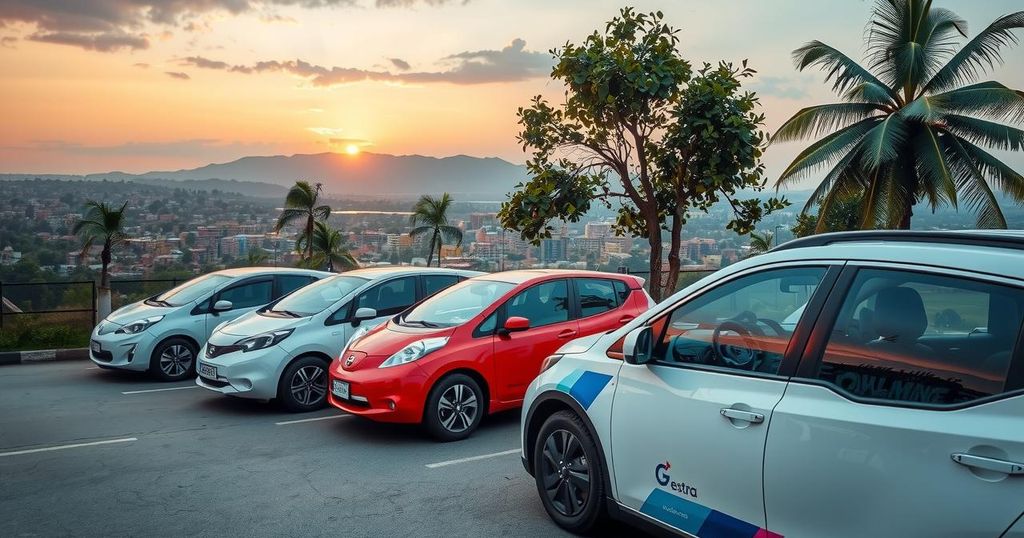Nigeria’s Path to Sustainable Transportation: Embracing Electric Vehicles
Sunday Aluko, a Nigerian automotive expert, urges Nigeria to adopt electric vehicles to reduce fuel dependency and revolutionize transportation. He emphasizes the need for infrastructure improvement, government incentives, and collaboration with global manufacturers to facilitate this transition. Aluko believes that embracing electric mobility can lead Nigeria towards economic growth and environmental sustainability.
Sunday Aluko, a recognized Nigerian expert in the automotive manufacturing sector based in the United States, has emphasized the critical need for Nigeria to adopt electric vehicles (EVs). He contends that this transition could significantly diminish the nation’s dependence on imported fuel and innovate its transportation framework. Aluko advocates for comprehensive reforms across Nigeria’s energy and automotive sectors as crucial steps to facilitate this shift.
In a recent discussion, Aluko highlighted pressing issues such as escalating fuel prices, recurrent shortages, and rampant fuel theft as compelling factors to consider eco-friendly alternatives like electric vehicles. His research indicates that EVs could play a pivotal role in addressing Nigeria’s current energy and transportation dilemmas. Moreover, he called for prioritizing the establishment of electric vehicle infrastructure and promoting investments to mitigate environmental damage and lessen fuel reliance.
Nevertheless, Aluko underscored the significant challenge posed by insufficient infrastructure, particularly the lack of charging stations, which impedes widespread adoption of electric vehicles. He urged government intervention to implement incentives, such as lowered import duties on EVs and tax relief for manufacturers, to encourage this essential transition. “This situation underscores the importance of creating a favourable environment for electric vehicle adoption. Without the right policies and infrastructure, the transition will remain a distant goal,” – Sunday Aluko.
To further advance local production capabilities, Aluko supports fostering partnerships with leading global EV manufacturers, which would decrease costs and generate employment opportunities. He expressed a vision of establishing Nigeria as a frontrunner in green mobility within Africa, stating, “I am particularly focused on enabling Nigeria to lead in green mobility solutions in Africa. The shift to electric vehicles is not just an environmental necessity; it’s an economic opportunity.”
Aluko proposed several innovative strategies to promote electric vehicle utilization in Nigeria, including the implementation of solar-powered charging stations and the development of affordable financing options for consumers. He insists that these measures are crucial first steps in reducing fuel dependency and enhancing Nigeria’s position in sustainable transportation throughout Africa. He firmly believes that, with the appropriate policies, infrastructure, and public understanding, Nigeria can successfully shift to electric vehicles, fostering economic growth and energy independence. “With the right policies, infrastructure, and public awareness, Nigeria can transition to electric vehicles, creating a future of economic growth, environmental sustainability, and energy independence,” – Sunday Aluko.
The discussion surrounding electric vehicles is becoming increasingly significant in Nigeria, particularly due to the nation’s ongoing struggles with fuel dependency and environmental degradation. The automotive sector, traditionally dominated by fossil-fuel-powered vehicles, faces the pressing need for transformation in light of rising fuel costs and shortages. Experts advocate for electric vehicles as a potential solution, emphasizing the necessity for infrastructure development, government incentives, and public adoption to realize this transition effectively.
In conclusion, the call to embrace electric vehicles in Nigeria presents both an environmental imperative and an economic opportunity. The insights provided by Sunday Aluko underscore the multidimensional benefits of transitioning to electric mobility, ranging from reduced fuel dependency and environmental sustainability to job creation and economic growth. Achieving this vision will require concerted efforts from both the government and private sectors to establish the necessary infrastructure and policies.
Original Source: punchng.com




Post Comment